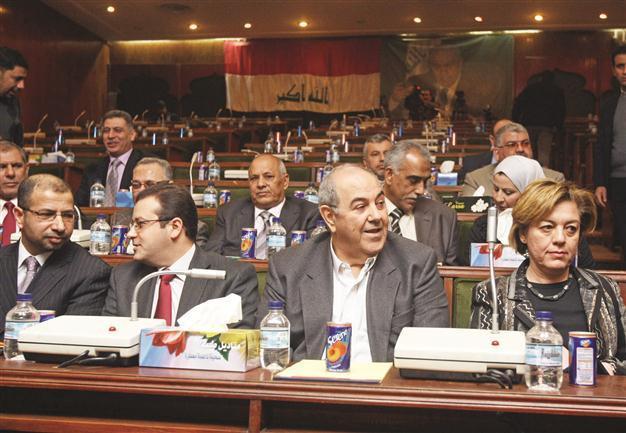Sunni bloc returns to Parliament in Baghdad
BAGHDAD

Ayad Allawi (2nd R), the head of the Iraqiya party, sits in Parliament with members of his party in Baghdad on Jan 29. The secular bloc ended a boycott of Parliament recently.
Iraq’s Sunni-backed Iraqiya bloc returned to Parliament yesterday, ending its boycott over the political crisis within Shiite Prime Minister Nouri al-Maliki’s government, with several of its ministers holding out by snubbing his Cabinet.
Iraqiya’s return to Parliament came as Iraq’s political blocs wrangle to end the turmoil that stoked fears of a revival of sectarian violence days after the last American troops left the OPEC-member country in mid-December 2011. The crisis began after al-Maliki’s government sought the arrest of Sunni Vice President Tariq al-Hashemi and the removal of his Sunni Deputy Prime Minister Saleh al-Mutlaq, prompting Iraqiya to boycott Parliament and Cabinet meetings.
Iraqiya on Jan. 29 agreed to end its Parliament protest and most of its lawmakers returned to the legislature on yesterday, when they were scheduled to take part in discussions on the delayed 2012 budget bill. But Iraqiya’s ministers of finance, education, and science would not return Cabinet, demanding the return of al-Mutlaq.
At least three of Iraqiya’s ministers planned to attend the Cabinet meeting “because of the budget,” said Jaber al-Jaberi, lawmaker and member of the Iraqi Parliament’s Finance Committee. Ahmed al-Alwani, a senior Iraqiya lawmaker, said the bloc would continue talks over the next few days about its Cabinet boycott.
But talks between al-Maliki’s Shiite alliance and Iraqiya had so far not touched on al-Mutlaq’s return, another senior Iraqiya source said. Maliki appears to have shored up his own position during the crisis, as Iraqiya is deeply splintered. Some of its ministers kept working, and a group of its lawmakers threatened to break away over the boycott, which they saw as politically damaging.
As the political atmosphere continues to simmer, Iraq’s Interior Ministry has said in a statement that security forces had detained 16 of al-Hashemi’s bodyguards. “Interior Ministry security forces have detained 16 members of Vice President of the Republic Tariq al-Hashemi’s guard, who were practicing assassinations with silenced rifles and pistols, targeting Interior Ministry officers and judges,” said a statement posted on the ministry’s website Jan. 29. The statement also said the guards had confessed after being detained and the arrests followed confessions by some of their colleagues.
The fugitive vice president said the statement was nothing new and followed a series of false accusations. Al-Hashemi is hiding in the autonomous Kurdish region of northern Iraq after being accused in mid-December 2011 of running a death squad.
The Iraqi political battle coincides with a wave of bombing attacks, most of them targeting Shiites. The twin crises have raised fears of a reprise of the conflict five years ago, when heavily armed Shiite and Sunni militias battled each other and brought the nation to the brink of civil war.
On the evening of Jan. 30 three Iraqi soldiers were killed when a parked car bomb detonated near a military patrol in Baqouba, a former al-Qaida stronghold, 60 km northeast of Baghdad. Three soldiers were also wounded in the bombing, said Maj. Ghalib al-Karkhi, a police spokesman in Diyala province.
